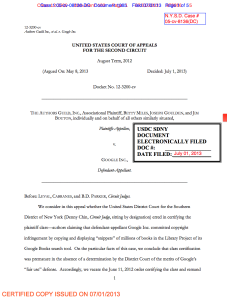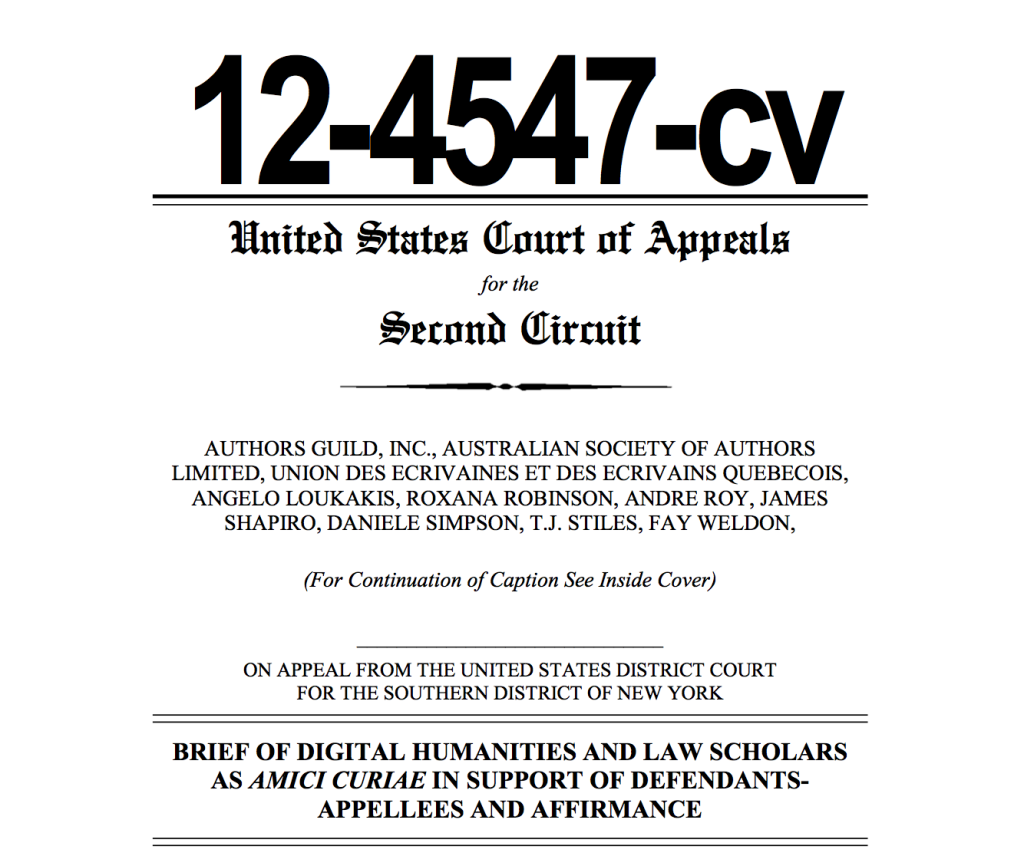Call for Support
We are seeking your support for our amicus brief in the Court of Appeals in Authors Guild v. Hathitrust. We believe that this case will have a dramatic effect on research in computer science to linguistics, history, literature and the digital humanities.
Background
In 2005, the Authors Guild, a lobby group with about 8,500 members including published authors, literary agents and lawyers, filed a class-action lawsuit claiming that Google’s library digitization project was a “massive copyright infringement”. A settlement was proposed in that case in 2008, modified after strenuous objections from academics, other author groups and several foreign governments in 2009 and rejected by the court in 2011.In September 2011, in a separate case, the Authors Guild sued several universities and the HathiTrust for participating in Google’s book-scanning project. On July 7, 2012 the Association for Computers and the Humanities and more than 60 scholars from disciplines ranging from law and computer science to linguistics, history and literature, filed an amicus curiae brief in Authors Guild v HathiTrust on behalf of the digital humanities.
District Court Decision
On October 10, 2012, Judge Baer (Southern District of New York) ruled against the Authors Guild and their fellow plaintiffs and held that the library digitization for uses such as text-mining are “transformative” as that term of art is used in copyright law and, on balance, fair use (i.e., not copyright infringement). Judge Baer’s opinion cites our amicus brief, adopts one of our examples and appears to follow the basic structure of our legal argument.
Appeal
The Authors Guild is now appealing Judge Baer’s decision (on this and other grounds) and we would like your support in drafting a new brief for the U.S. Court of Appeals for the Second Circuit.
Argument in a nutshell
According to the U.S. Constitution, the purpose of copyright is “To promote the Progress of Science and useful Arts”. Copyright law should not be an obstacle to statistical and computational analysis of the millions of books owned by university libraries. Copyright law has long recognized the distinction between protecting an author’s original expression and the public’s right to access the facts and ideas contained within that expression. That distinction must be maintained in the digital age so that library digitization, internet search and related non-expressive uses of written works remain legal.
Draft available on request
Email matthewsag@gmail.com for a full draft, or download our previous effort (in related district court litigation) here. The final brief will be very similar to this.
How you can help preserve the balance of copyright law
(1) You can let us know that you would like to join our brief (we need your name and affiliation e.g. Associate Professor, Jane Doe, Springfield University). We would also like to add a one line description of any aspect of your work that is relevant to the brief, e.g. ___ Grant to study ___ in ____ literary corpus or a relevant publication.
Please note that ours is not the only amicus brief being filed in this case. Jennifer Urban (U.C. Berkeley) will also be filing a brief on arguing that the plaintiffs do not represent the interests of academic authors who comprise a large proportion of the class. YOU CAN’T SIGN BOTH. Please consider endorsing whichever brief speaks most closely to your concerns as an academic.
(2) You can point us toward easy to understand and compelling examples of the kind of research enabled by mass-digitization (we can’t include all your wonderful work, but we would like to understand it better).
(3) You can send
this link to other academics and Phd students.
Thank you!
Matthew Sag, Matthew Jockers and Jason Schultz




